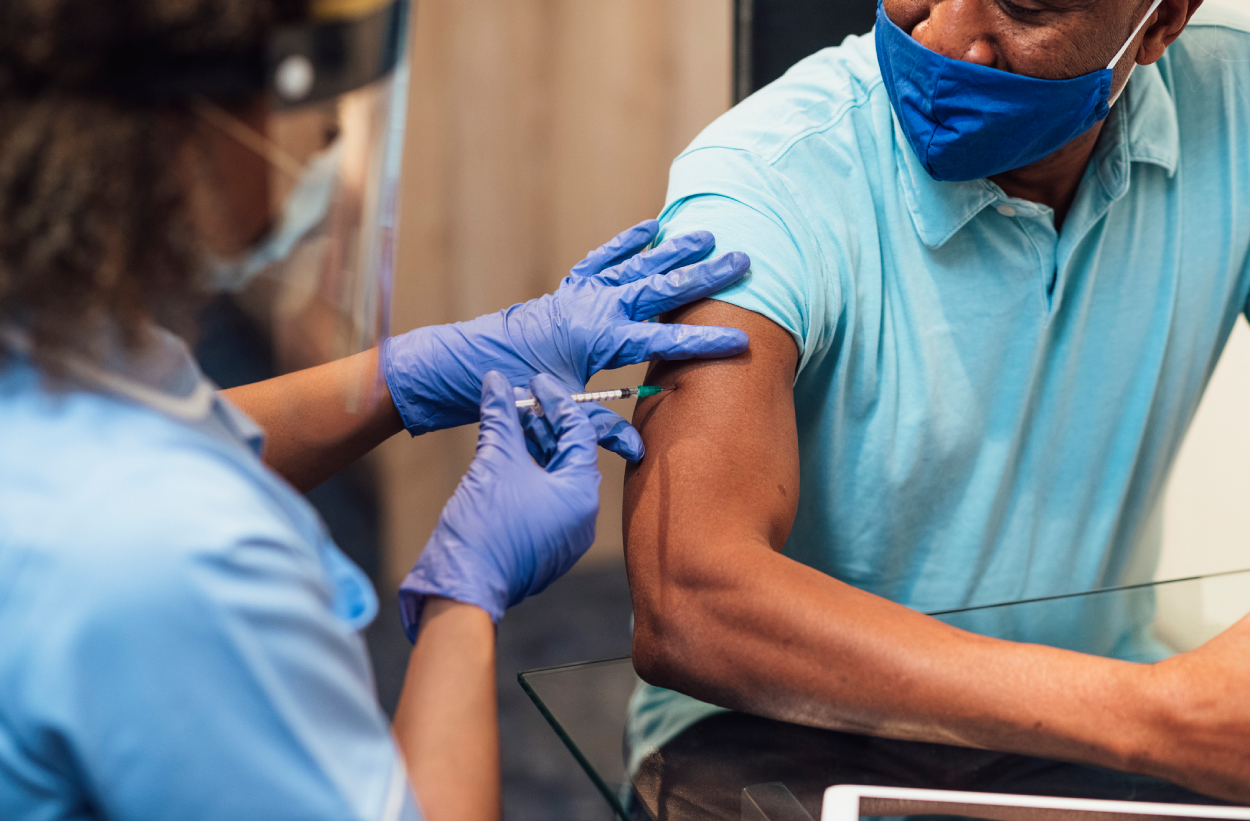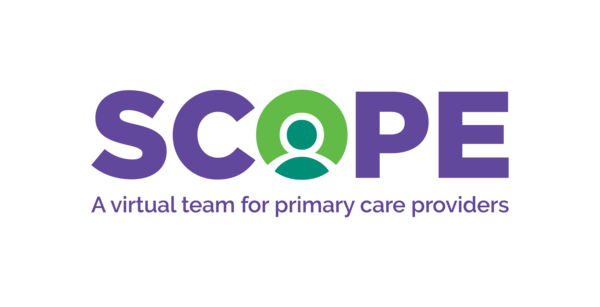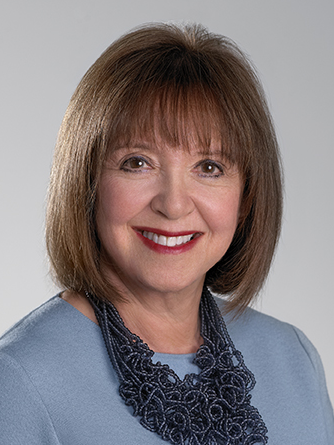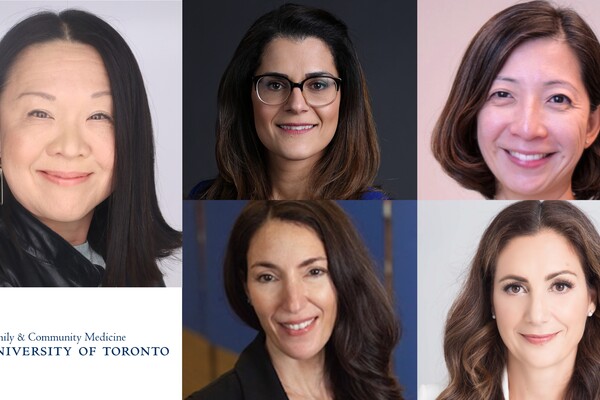Helping hands: U of T med students aid family doctors in fulfilling COVID vaccine needs


In-person meetings abruptly stopped when the pandemic lockdowns first hit. Many doctors’ offices operated entirely virtually for many months. Now, most have settled on a hybrid model.
The pandemic also exposed social inequities that affect access to health care. Vaccine availability is similarly impacted by language, cultural and economic barriers.
The patient experience has fundamentally changed, bringing new questions and challenges to our health care system: How can patients’ vaccine needs be met during a disorientating and unfamiliar time, especially in the virtual realm? And how can family doctors handle the flood of requests due to COVID-19?
The SCOPE program, which stands for Seamless Care Optimizing the Patient Experience, is addressing these barriers. In December 2021, SCOPE launched the Student Vaccine Initiative with undergraduate medical students in IgFM, the Interest Group in Family Medicine, which is part of the University of Toronto’s Department of Family & Community Medicine (DFCM), with the initiative running until May 2022.

“Family doctors were overwhelmed with urgent care and catch-up for their patients with chronic conditions on top of vaccinations, and community practitioners reported limited time to connect with patients who experience significant barriers. Meanwhile, med students were eager and had the capacity. SCOPE successfully matched the two,” says Dr. Pauline Pariser, a Professor at DFCM and Chair of the Mid-West Toronto Ontario Health Team, who founded SCOPE in 2012.
The initiative has a health equity lens, extending health services to reach racialized communities better. “The rich diversity of U of T’s medical school helped connect students of colour to people of colour,” Pariser says.
SCOPE has connections and resources for family doctors not affiliated with hospital teams. “We offer nine SCOPE hubs across the Greater Toronto Area that provide ‘insider knowledge’—doctors can call, give us their geographic location and get custom services,” she explains.
SCOPE builds relationships between family practices and teams including internists, radiologists, nurse navigators, and home and community care coordinators to assist with patient co-management. It acts as a liaison that keeps doctors up-to-date on referrals, connects them to needed hospital and community resources, and prevents issues like patients going to the emergency room for conditions that could be managed in the community.
“In a nutshell, we facilitate a smoother patient and family physician provider experience,” Pariser adds.
The difficulty in getting vaccine bookings and information led the SCOPE team to improve the patient experience here as well – by starting the Student Vaccine Initiative.
Helping family doctors keep patients healthy
Within the Student Vaccine Initiative, there were 20 offices expressing interest, with 19 doctors participating overall.
SCOPE’s team includes Jaime Best, Nurse Navigator in Mid-West Toronto, the liaison connecting practices and students, and Dr. Ruby Alvi, DFCM’s Medical Student Leadership and Engagement Lead and an Assistant Professor, and a family doctor.
“The initiative gave a little push to encourage many patients to get their COVID vaccine or boosters,” says Dr. Bowen Chan, a family physician at HealthSource Medical clinic in Toronto and one of the supervising doctors who worked with two MD students.
“My student volunteers were a great help and were very efficient and independent: They conducted hundreds of phone calls daily by themselves, and were able to manage patient issues.”
Family physicians are often fully booked and don’t have the time or staff to fulfil vaccine needs for every patient – administering, scheduling and educating – especially during the busiest times, Chan adds. “The initiative freed me up to attend to other patient needs. The students helped get everyone their vaccines to keep them healthy.”
The med students volunteered at his clinic from January to May 2022, calling about 150 to 200 patients per session and ultimately completing the entire list of around 1,800 patients from Chan’s practice.
This time period was critical, containing multiple Omicron waves. It was often difficult to get a vaccine appointment due to technical issues and slots filling up quickly. There was also misinformation and distrust around the vaccine—especially among the elderly population, low technology users and non-English speakers.
While most patients needed to book third doses, some needed initial doses or basic information about the vaccine. Overall, patients’ vaccine needs varied; students adapted to each case to help them.
At the end of the initiative, 300 of Chan’s patients successfully scheduled their vaccines, thanks to the two student volunteers’ efforts. They also played a pivotal role in continuity of care. “In several cases, the students were able to establish a level of trust, leading to patients opening up about more health concerns, which I then followed up on,” says Chan.
Clinical experience for students
When SCOPE approached IgFM, the Interest Group in Family Medicine at DFCM, about collaborating to form the Student Vaccine Initiative in late 2021, the student leaders were immediately on board.
“As students and future health care professionals, it was important to us to get involved and play our part during COVID. We wanted to support physicians and all front-line workers going through a challenging time,” says Heba Shahaed, the group’s Junior President, St. George Campus.
Their role was to project manage and coordinate: They came up with a logistics plan to recruit student volunteers, match them with the participating doctors and organize patient lists. In total, 30 MD student volunteers signed up.
It was an opportunity for students to get valuable clinical exposure. Normally, a significant portion of a first-year med student’s schedule is for in-person clinical experience, which had to be reduced or switched to virtual during COVID. “Students learned more about serving communities and had one-on-one time with the doctors and patients—they were thrilled to get that chance,” says Purathani Shanmuganathan, the group’s President, Mississauga Academy of Medicine.
The initiative allowed students to see through the eyes of different patients and empathize. “Health is multifaceted. We had to think outside of the box to identify and address vaccine barriers from various perspectives,” Shanmuganathan adds. “At home, we saw firsthand that our own family members were struggling with getting the vaccine, and knew others were, too.”
Medical students were chosen to meet the needs of the family doctor’s community, for instance, cultural or language needs. “A clinic with a significant Black patient population requested Black medical student volunteers, and a doctor requested Greek speakers,” says Shakeel Subdar, the group’s Addictions Representative. “This way, patients and volunteers could better connect and resonate with one another.”
Knowing they were making a different in elderly and marginalized populations was a motivating factor, Subdar adds. “We learned the importance of building trust virtually, being kind and patient, and approaching vaccine issues in an open-minded way, even if beliefs are different.”
Students can learn more about IgFM here.
Physicians can access SCOPE services on the website, scopehub.ca.
News



